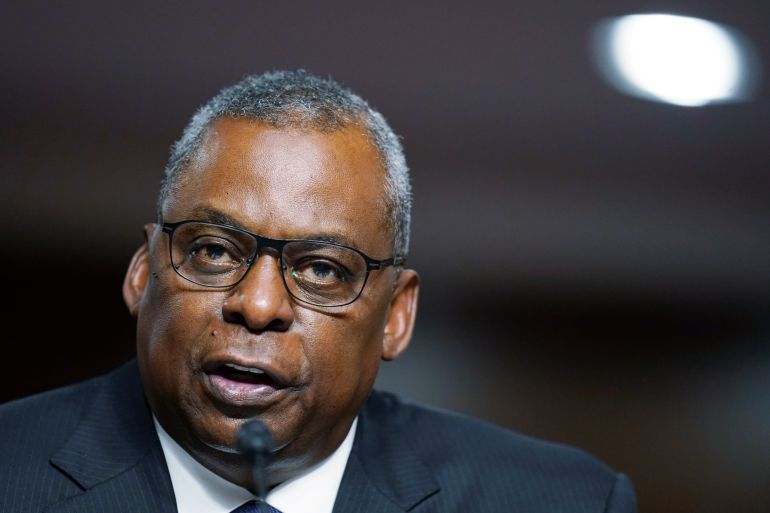US defence chief pledges to counter Iran during Bahrain visit
Lloyd Austin seeks to reassure Middle East allies that President Biden’s administration is committed to the region.

The United States’s top defence official has pledged to prevent Iran from obtaining a nuclear weapon, as negotiations remain stalled over Tehran’s tattered atomic deal with world powers, in comments that appeared aimed at reassuring the US’s Gulf Arab allies.
US Defense Secretary Lloyd Austin’s comments in Bahrain at the annual Manama Dialogue on Saturday come as the Biden administration tries to revive the nuclear deal, which limited Iran’s enrichment of uranium in exchange for the lifting of economic sanctions.
Keep reading
list of 3 itemsWhat’s next for Afghans who fled to the United States?
The UAE’s illegal influence over the United States
His remarks also come after the chaotic US withdrawal from Afghanistan, raising concerns among Gulf countries about Washington’s commitment to the region as US defence officials say they want to pivot forces to counter perceived challenges from China and Russia.
“The United States remains committed to preventing Iran from gaining a nuclear weapon. And we remain committed to a diplomatic outcome of the nuclear issue,” Austin told an event put on by the International Institute for Strategic Studies.
“But if Iran isn’t willing to engage seriously, then we will look at all of the options necessary to keep the United States secure.”
The Pentagon chief said that the US would be coming to the indirect negotiations on reviving the deal on November 29 in good faith.
Iran long has maintained its nuclear programme is peaceful, though US intelligence agencies and the International Atomic Energy Agency say Tehran had an organised weapons programme until 2003.
Iran’s mission to the United Nations did not immediately respond to a request for comment on Saturday.
Reshuffling forces
Since then-President Donald Trump unilaterally withdrew the US from the Iran nuclear deal in 2018, a series of escalating incidents have struck the wider region. That includes drone and mine attacks aimed at vessels at sea, as well as assaults blamed on Iran and its proxies in Iraq and Syria. The US also killed a top Iranian general in Baghdad in early 2020, which saw Iran attack American troops in Iraq with ballistic missiles.
Under Biden, US military officials are looking at a wider reshuffling of forces from the Middle East to other areas, though it still maintains a large presence at bases across the region. Austin hinted at that in his remarks, saying: “Our potential punch includes what our friends can contribute and what we have prepositioned and what we can rapidly flow in.”
“Our friends and foes both know that the United States can deploy overwhelming force at the time and place of our choosing,” Austin said.
It was unclear how much effect Austin’s speech would have with allies in the Middle East, since it is not backed by any announcements of further deployments or new weapon sales in the region.
A senior US defence official, speaking to the Reuters news agency on the condition of anonymity, said Austin was not expected to make any new commitments in the region on the trip.
Saudi Arabia, one of the United States’ closest allies in the region, has been frustrated by Biden’s approach to the region.
The Biden White House has been pressuring Saudi Arabia to improve its record on human rights, including the release of political prisoners, such as women’s rights advocates, from jail.
Austin was set to visit Saudi Arabia in September but the trip was postponed at the last minute. He will not be visiting Riyadh on this trip.